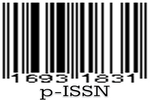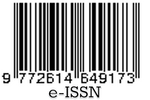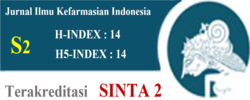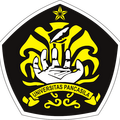Isolasi Mikroba Endofitik dari Tumbuhan Quisqualis indica L. dan Uji Potensinya dalam Menghasilkan Senyawa Antimikroba
Abstract
Endophytic microbe is a definition which is given to all microorganisms that during a more or less long period of their life, colonize symptomnlessly the living tissues of their hosts. The endophytes can produce useful substances such as oligosaccharide degrading enzyme, antimicrobial substances and plant growth regulator. Quisqualis indica is one of tropical herb that is widely known for traditional medicine. There is no information about endophytic microbes of this plant. The aim of this study are to isolate the endophytic microbes from Q. indica, and screen on their ability in producing antimicrobial substances. Isolation is conducted by direct seed plating method using PDA and NA medium. Liquid fermentation method is taken place using supernatant F4 and PDY medium, then followed by bioassay of the supernatant on three test microbes: Staphylococcus aureus, Escherichia coli and Candida albicans. Result of isolation is 25 bacterial isolates and 12 fungal isolates. Result of bioassay showed that there are some isolates that have ability in producing antimicrobial substances. There are 1 bacterial isolate and 2 fungal isolates that showed wide spectrum activity of antimicrobial substance.
References
2. Wijayakusuma, H., S. Dalimarta & A.S. Wirian. 1991. Tanaman Berkhasiat Obat di Indonesia.
Jilid III. Pustaka Kartini, Jakarta
3. Dalimarta, S. 1999. Ramuan Tradisional untuk Pengobatan Kanker. PT Penebar Swadaya, Jakarta.
4. Peirini,O., T.N.Sieber, L. Toti & O. Viret. 1992. Ecology, metabolite production and substrate utilization in endophytic fungi. Nat. Toxins. 1: 185 - 196.
5. Wahyudi, P. 1997a. Teknik Skrining Mikroba Endofitik Penghasil Antibiotika Baru. Laporan Teknis Intern BPPT. Jakarta 6.
6. Wahyudi, P. 1997b. Mikroba Endofitik sebagai Penghasil Materi yang Bermanfaat. Laporan Teknis Intern BPPT. Jakarta.
7. Bacon, C.W. 1988. Procedur for isolating the endophytic from tall fescue and screening isolates for ergot alkaloids. Appl. Environ. Microbiol. 54:2615 – 2618.
Licencing
All articles in Jurnal Ilmu Kefarmasian Indonesia are an open-access article, distributed under the terms of the Creative Commons Attribution-NonCommercial-ShareAlike 4.0 International License which permits unrestricted non-commercial used, distribution and reproduction in any medium.
This licence applies to Author(s) and Public Reader means that the users mays :
- SHARE:
copy and redistribute the article in any medium or format - ADAPT:
remix, transform, and build upon the article (eg.: to produce a new research work and, possibly, a new publication) - ALIKE:
If you remix, transform, or build upon the article, you must distribute your contributions under the same license as the original. - NO ADDITIONAL RESTRICTIONS:
You may not apply legal terms or technological measures that legally restrict others from doing anything the license permits.
It does however mean that when you use it you must:
- ATTRIBUTION: You must give appropriate credit to both the Author(s) and the journal, provide a link to the license, and indicate if changes were made. You may do so in any reasonable manner, but not in any way that suggests the licensor endorses you or your use.
You may not:
- NONCOMMERCIAL: You may not use the article for commercial purposes.
This work is licensed under a Creative Commons Attribution-NonCommercial-ShareAlike 4.0 International License.





 Tools
Tools





















